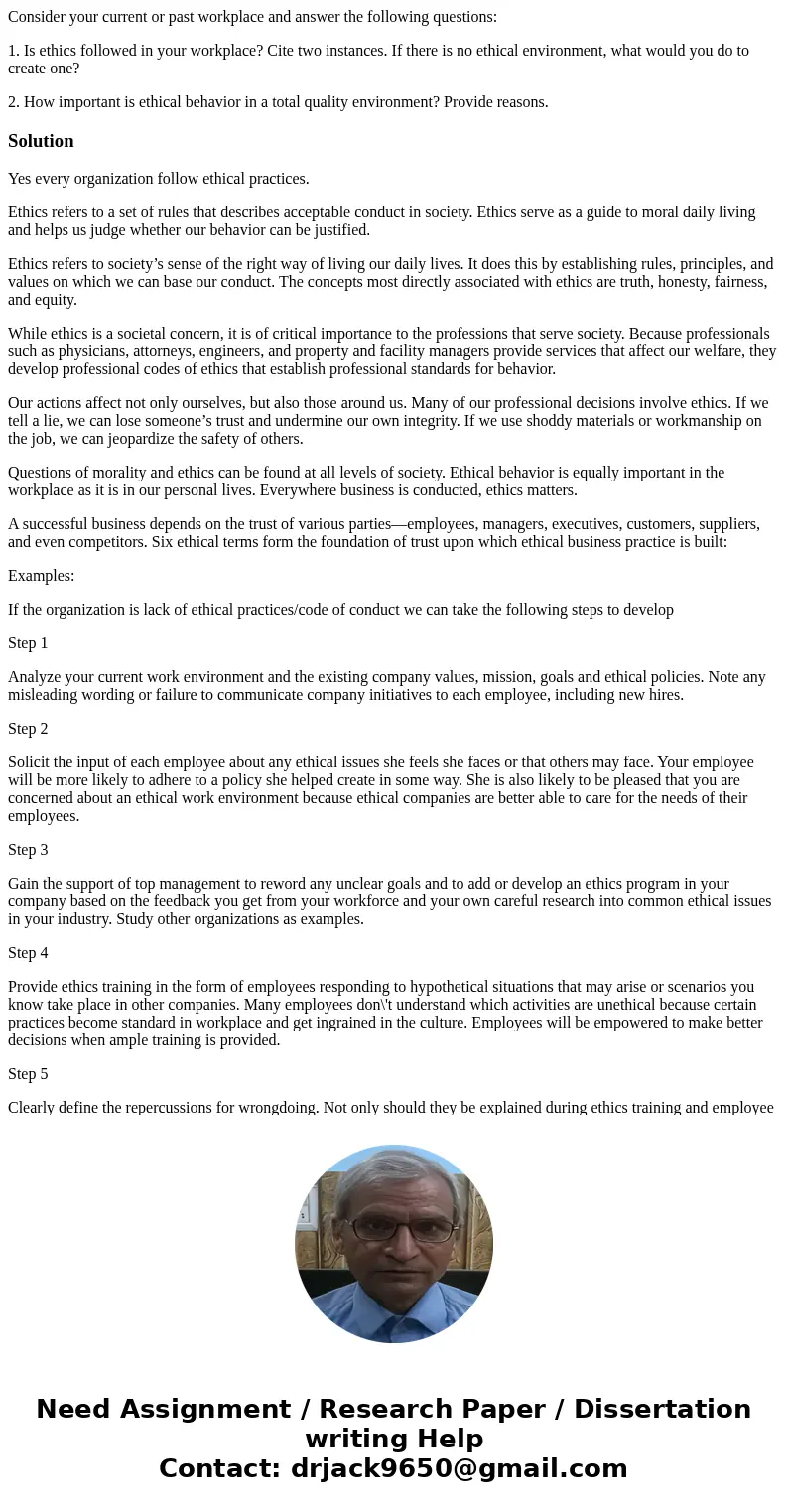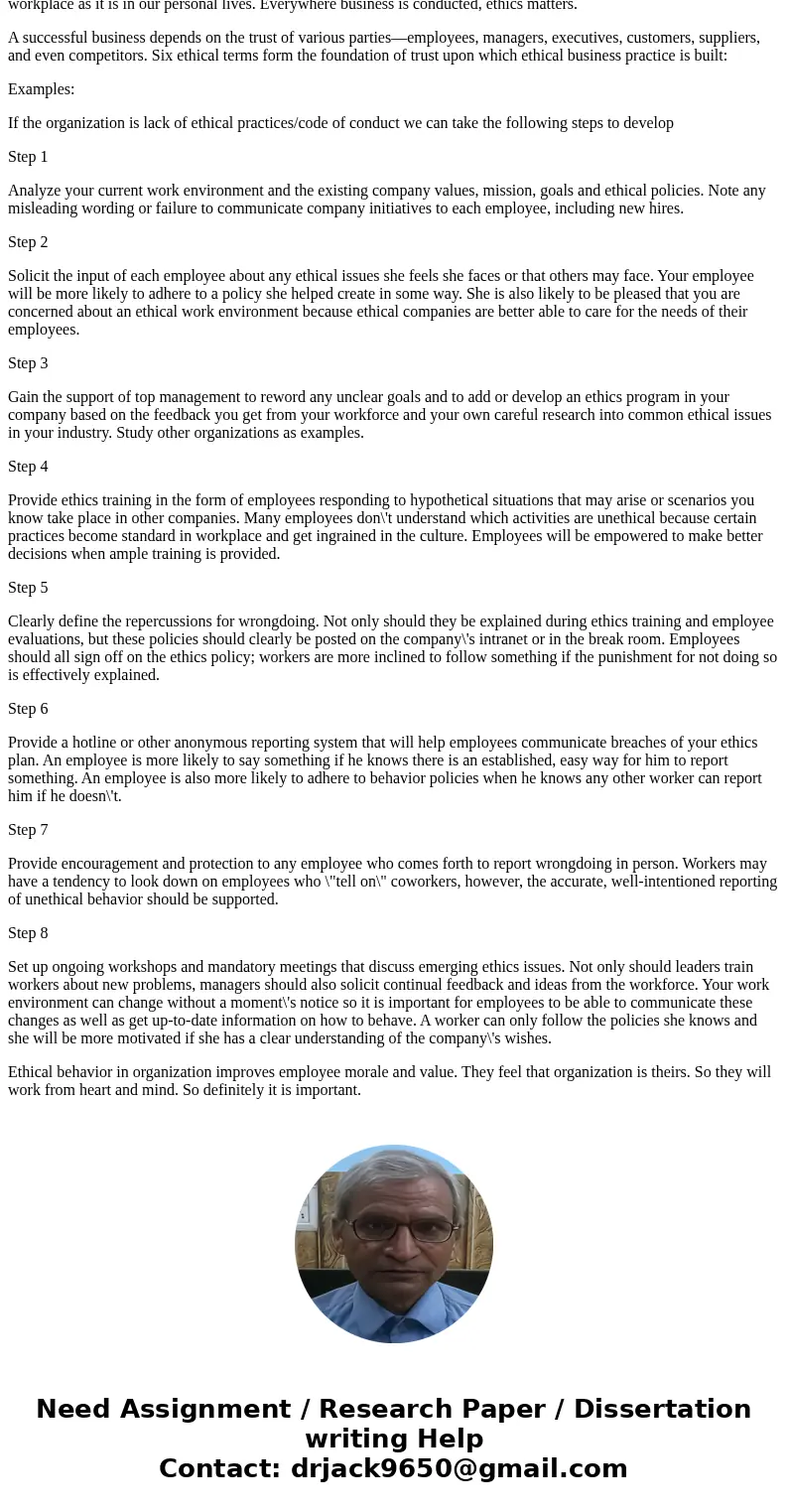Consider your current or past workplace and answer the follo
Consider your current or past workplace and answer the following questions:
1. Is ethics followed in your workplace? Cite two instances. If there is no ethical environment, what would you do to create one?
2. How important is ethical behavior in a total quality environment? Provide reasons.
Solution
Yes every organization follow ethical practices.
Ethics refers to a set of rules that describes acceptable conduct in society. Ethics serve as a guide to moral daily living and helps us judge whether our behavior can be justified.
Ethics refers to society’s sense of the right way of living our daily lives. It does this by establishing rules, principles, and values on which we can base our conduct. The concepts most directly associated with ethics are truth, honesty, fairness, and equity.
While ethics is a societal concern, it is of critical importance to the professions that serve society. Because professionals such as physicians, attorneys, engineers, and property and facility managers provide services that affect our welfare, they develop professional codes of ethics that establish professional standards for behavior.
Our actions affect not only ourselves, but also those around us. Many of our professional decisions involve ethics. If we tell a lie, we can lose someone’s trust and undermine our own integrity. If we use shoddy materials or workmanship on the job, we can jeopardize the safety of others.
Questions of morality and ethics can be found at all levels of society. Ethical behavior is equally important in the workplace as it is in our personal lives. Everywhere business is conducted, ethics matters.
A successful business depends on the trust of various parties—employees, managers, executives, customers, suppliers, and even competitors. Six ethical terms form the foundation of trust upon which ethical business practice is built:
Examples:
If the organization is lack of ethical practices/code of conduct we can take the following steps to develop
Step 1
Analyze your current work environment and the existing company values, mission, goals and ethical policies. Note any misleading wording or failure to communicate company initiatives to each employee, including new hires.
Step 2
Solicit the input of each employee about any ethical issues she feels she faces or that others may face. Your employee will be more likely to adhere to a policy she helped create in some way. She is also likely to be pleased that you are concerned about an ethical work environment because ethical companies are better able to care for the needs of their employees.
Step 3
Gain the support of top management to reword any unclear goals and to add or develop an ethics program in your company based on the feedback you get from your workforce and your own careful research into common ethical issues in your industry. Study other organizations as examples.
Step 4
Provide ethics training in the form of employees responding to hypothetical situations that may arise or scenarios you know take place in other companies. Many employees don\'t understand which activities are unethical because certain practices become standard in workplace and get ingrained in the culture. Employees will be empowered to make better decisions when ample training is provided.
Step 5
Clearly define the repercussions for wrongdoing. Not only should they be explained during ethics training and employee evaluations, but these policies should clearly be posted on the company\'s intranet or in the break room. Employees should all sign off on the ethics policy; workers are more inclined to follow something if the punishment for not doing so is effectively explained.
Step 6
Provide a hotline or other anonymous reporting system that will help employees communicate breaches of your ethics plan. An employee is more likely to say something if he knows there is an established, easy way for him to report something. An employee is also more likely to adhere to behavior policies when he knows any other worker can report him if he doesn\'t.
Step 7
Provide encouragement and protection to any employee who comes forth to report wrongdoing in person. Workers may have a tendency to look down on employees who \"tell on\" coworkers, however, the accurate, well-intentioned reporting of unethical behavior should be supported.
Step 8
Set up ongoing workshops and mandatory meetings that discuss emerging ethics issues. Not only should leaders train workers about new problems, managers should also solicit continual feedback and ideas from the workforce. Your work environment can change without a moment\'s notice so it is important for employees to be able to communicate these changes as well as get up-to-date information on how to behave. A worker can only follow the policies she knows and she will be more motivated if she has a clear understanding of the company\'s wishes.
Ethical behavior in organization improves employee morale and value. They feel that organization is theirs. So they will work from heart and mind. So definitely it is important.


 Homework Sourse
Homework Sourse